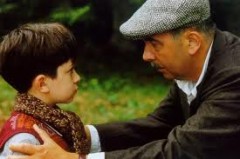Gerard Jugnot’s Monsieur Batignole recreates the period in Nazi-occupied France when French collaboration with the German occupiers was not an unusual phenomenon.
Many French men and women risked life and limb to resist the Germans. But some chose the path of least resistance and preyed on Jews, the objects of demonization and persecution, to gain material advantages.
The film, set in Paris in the summer of 1942, unfolds as Parisian Jews are rounded up in one great sweep before they are deported to Nazi extermination camps in Poland.

The Bernsteins, a Jewish family, live in an apartment above the butcher shop of Edmond Batignole (Gerard Jugnot). With the arrest of the Bernsteins, Batignole’s opportunistic son-in-law, Pierre-Jean (Jean-Paul Rouve), a dyed-in-the-wool fascist and antisemite, urges his father-in-law to take advantage of their misfortune.
A true believer who dreams of the day when France will be “cleansed” of “Jews and terrorists”, he implores Batignole to appropriate the Bernsteins’ spacious flat. Batignole’s rapacious wife agrees, but Batiognole is hesitant. He has scruples and does not particularly care for the Germans, against whom he fought as a soldier in World War I. Under the influence of his family, Batignole takes over the apartment and caters a reception for a German colonel who knows Pierre-Jean.
Monsieur Batignole — scheduled to be screened by the Toronto Jewish Film Society on Nov. 10 at 4 p.m. and again at 7:30 p.m. at the JCC’s Al Green Theatre — takes a sharp turn when Simon Bernstein (Jules Sitruk), the Bernstein’s young son, suddenly appears in his parents’ former flat.
Batignole is surprised by his appearance, having assumed that the Bernsteins would never return. “Just my luck,” he says. “This is all I need.” Batignole can call the police and settle the matter immediately, but his conscience kicks in and he decides to protect the boy.
After a while, however, Batignole can no longer tolerate the stress of tending to Simon. “You’re a ticking bomb,” he says, mindful of the risks he is taking.
Batignole devises a scheme to smuggle Simon and his two cousins, both girls, into neutral Switzerland. For the plot to succeed, Batignole must be generous yet ruthless. In the service of a higher cause, he manages to summon up these qualities just when he needs them.
Given the subject matter, the film is usually serious and somber. But in a sudden and complete change of tone, Jugnot inserts a hilarious scene in which a bumbling Batignole pretends to be a surgeon as he treats a German soldier who has twisted his knee in an accident.
Monsieur Batignole achieves a kind of balance in its portrayal of the French. Pro-Nazi villains abound, like Pierre-Jean and a malevolent policeman in a village who will stop at nothing to nab and turn in Jewish children. But there are also decent French people, ranging from Batignole to a woman on a farm who extends a hand of kindness.
The movie, 100 minutes in length, succeeds in painting a realistic and chilling picture of a nation under the boot of a brutal occupation. Jugnot, in his dual capacity as director and actor, shines from start to finish. But Sitruk steals the show in a mesmerizing performance.